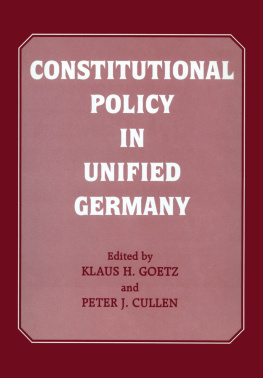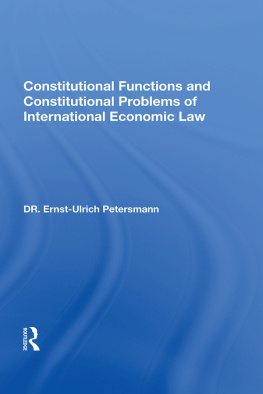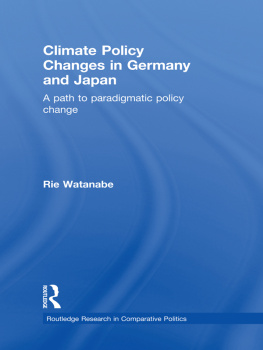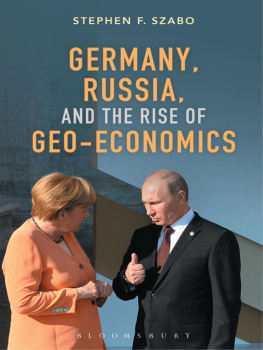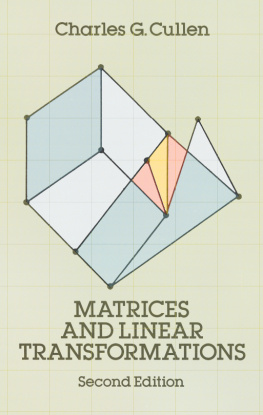First published in 1995 by
FRANK CASS AND COMPANY LIMITED
This edition published 2013 by Routledge
711 Third Avenue, New York, NY 10017
2 Park Square, Milton Park, Abingdon, Oxon OX14 4RN
Routledge is an imprint of the Taylor & Francis Group, an informa business
Copyright 1995 Frank Cass & Co. Ltd
ISBN 0-7146-4631-8 (hardback)
ISBN 0-7146-4204-5 (paperback)
British Library Cataloguing in Publication Data
Constitutional Policy in Unified Germany
I. Goetz, Klaus H. II. Cullen, Peter J.
344.302
Library of Congress Cataloguing-in-Publication Data
Constitutional policy in Unified Germany/edited by Klaus H. Goetz, and
Peter J. Cullen.
p. cm.
ISBN 0-7146-4631-8
1. GermanyConstitutional law. 2. Germany (East)Constitutional law. 3.
GermanyHistoryUnification, 1990. I. Goetz, Klaus H., 1961-.II.
Cullen, Peter J., 1663.
KK4450.C67 1995
342.43dc20
(344.302)
This group of studies first appeared in a Special Issue of German Politics , Vol.3, No.3 (December 1994), [ Constitutional Policy in Unified Germany ].
All rights reserved. No part of this publication may be reproduced, stored in a retrieval system, or transmitted in any form, or by any means, electronic, mechanical, photocopying, recording or otherwise without the prior permission of the publisher.
The high hopes of many in 1990 that the achievement of unification would be crowned by a new Constitution for the unified Germany have been dashed, and there is little prospect of a popular referendum to affirm the Basic Law. Instead, continuity seems to prevail. The changes to the Basic Law contained in the Unification Treaty were restricted to those immediately necessitated by unification, and subsequent constitutional amendments, whilst important, have left the essential features of the Basic Law intact. There is little prospect that this will change in the foreseeable future. The proposals put forward by the Joint Bundestag-Bundesrat Commission on the Constitution in its report of October 1993 (see ) were, on the whole, so cautious that some questioned whether the energy invested in the Commission had not been wasted. A dispute between the Federal Government and the Bundesrat concerning the Commission's recommendations on the strengthening of the role of the Lnder in Federal legislation threatened, in August 1994, to block the adoption of the whole package of constitutional reform legislation. Although most of the recommendations were eventually passed into law in October 1994, the resultant changes to the Basic Law are not very far-reaching. They do not incorporate some of the more radical proposals to alter the constitutional order made by the Social Democratic Party and others during the debate, for example the introduction of plebiscitary decision-making.
However, the degree of continuity, or even stagnation, can easily be over-estimated. The constitutional amendments adopted at the time of unification, the amendments passed in December 1992 in connection with the ratification of the Maastricht Treaty, the new Article 16a on asylum of June 1993, and the amendments to pave the way for the privatisation of the public railways and the Bundespost have all had substantial constitutional implications. Perhaps more importantly, change to the text of the Basic Law is only one element of constitutional policy. Just as significant are judgments by the Federal Constitutional Court, the most recent example being the decision of 12 July 1994 on the deployment of German armed forces outside the NATO area. It should also be remembered that Federal constitutional law forms only one, albeit the most important, part of German constitutional law, as it is complemented by 16 Lnder constitutions. Finally, the Europeanisation and internationalisation of the legal system imply constitutional change which is not necessarily reflected in textual amendments to the Basic Law.
The present collection seeks to identify some of the central tasks of constitutional policy and analyses how, and with what degree of success, they are being fulfilled. The first contribution by Goetz and Cullen looks at internal and external challenges to the Basic Law which, they argue, threaten to undermine its centrality and directive capacity in the longer term. They include, in particular, the increasing importance of international legal frameworks and changes in state-society relations, which have the potential of marginalising national constitutional regulation. The most decisive external influence on the Basic Law is discussed by Georg Ress. He provides a critical assessment of the new Article 23 of the Basic Law (Article on European Union) as a means of responding to European integration and examines the judgment of the Federal Constitutional Court of 12 October 1993 on the Maastricht Treaty.
The implications of German membership in the European Union also play an important role in the contribution by Uwe Leonardy, who assesses the recommendations of the Joint Constitutional Commission, and the Bundesrat Commission on Constitutional Reform which preceded it. Leonardy highlights aspects of the federal system where further constitutional reform is required and points to the difficulties of achieving reform legislation.
Some of the reasons why such reforms prove so difficult to achieve are discussed in Arthur Benz's analysis of the Joint Constitutional Commission. He argues that the lack of innovative and forward-looking proposals in the Commission's report can in part be explained by reference to the Commission's institutional features and, in particular, the predominance of bargaining behaviour as opposed to rational arguing in its negotiations. Instead of providing for the open deliberation of constitutional issues, the Commission largely reproduced the established political framework and, thus, encouraged bargaining processes amongst the political lite. That more innovative constitutional ideas can find their way into constitutional law is underlined in Christian Starck's article on the constitutions of the new Lnder. Although Starck is sceptical about the usefulness of some of the new regulations, his analysis nonetheless points to the vitality and political relevance of this second layer of constitutional regulation in Germany.
The following two contributions point to elements of continuity and discontinuity in constitutional policy. In his article on the Federal Constitutional Court, Nevil Johnson discusses the new problems and challenges which the Court has faced since unification, but concludes that continuity in approach has clearly prevailed. The Court, he maintains, has been exceptionally successful in acquitting itself of the contentious and often delicate exercise in which it is engaged. Whereas, for the Court, the emphasis has been on 'business as usual', albeit more of it than before unification, Neil Walker, placing the German debate in the context of a wider discussion about constitutional purposes, points to developments which may change the significance of constitutional law in unified Germany. He argues that, on the one hand, the emergence of a politics of cultural identity suggests an increasingly pivotal role for constitutional law, which has always been closely concerned with identity questions. On the other hand, insofar as it makes constitutional actors the focus of political controversy and encourages a distorted view of law's regulatory potential, this same development might in the longer term undermine the legitimacy and effectiveness of constitutional law. The latter argument is also taken up in the concluding theses of Cullen and Goetz, which seek to identify some of the key themes emerging from the preceding papers. They argue that the constitutional debate in Germany overlooked a number of important theoretical questions concerning the proper scope of constitutional regulation and the form it should take.


